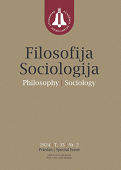Ekonominių ir religinių veiksnių įtaka postmaterialistinių vertybių sklaidai pirmojoje pokomunistinėje kartoje: lyginamoji 24 šalių analizė
The Impact of Economic and Religious Factors on the Spread of Post-materialist Values in the First Post-communist Generation: A Comparative Analysis of 24 Countries
Author(s): Laura DaukšaitėSubject(s): Sociology, Recent History (1900 till today), Social development, Social differentiation, History of Communism, Social Norms / Social Control
Published by: Lietuvos mokslų akademijos leidykla
Keywords: value change; first post-communist generation; Inglehart’s theory of value change;
Summary/Abstract: This article uses Inglehart’s theory of materialist–post-materialist value change to analyse the values of the first post-communist generation (born in 1991–2000) in 24 post-communist countries. The analysis of the data from the World and European Values Surveys of 1990–1993, 1999–2004, 2008–2014 and 2017–2022 waves leads to the conclusion that in the majority of post-communist countries, post-materialist values have become stronger in the first post-communist generation compared to those of older generations. This trend is particularly pronounced in the economically strong post-communist countries, but is also observed in the economically deprived ones. Only six countries show a statistically significant correlation between the importance of religion in people’s lives and materialistic–post-materialistic values in the first post-communist generation. The study also revealed that post-materialist values are more widespread in countries dominated by the Roman Catholic faith than in Orthodox and Islam-dominated countries in the first post-communist generation.
Journal: Filosofija. Sociologija
- Issue Year: 34/2023
- Issue No: 4 -Special
- Page Range: 76-91
- Page Count: 16
- Language: Lithuanian

